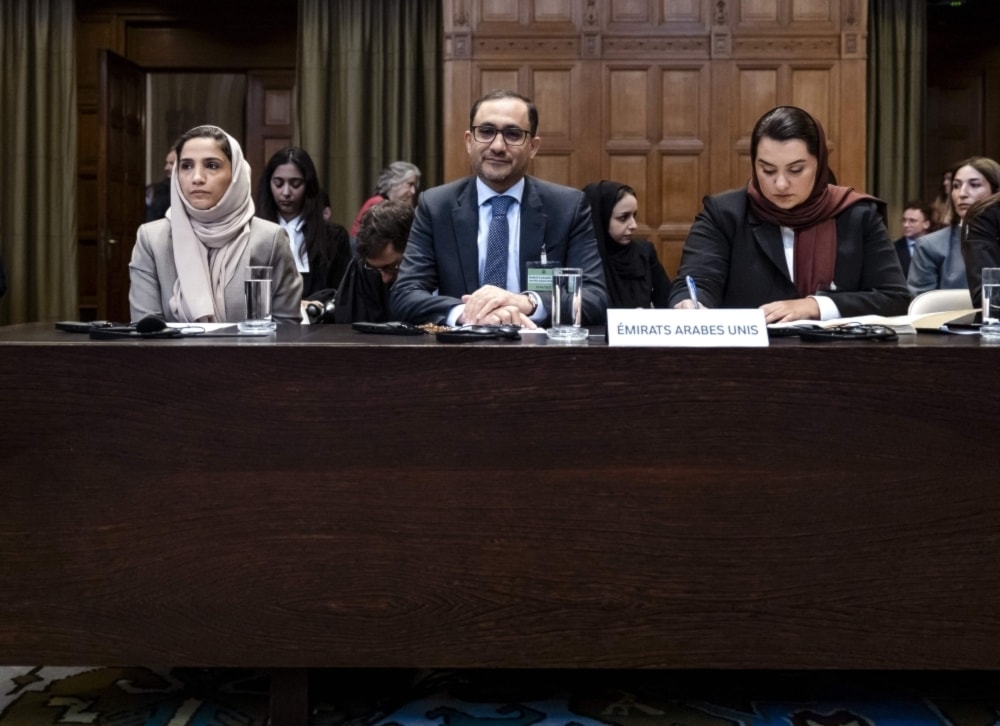Sudan tells ICJ UAE 'driving force' behind 'genocide'
Sudan has accused the UAE at the International Court of Justice of fueling genocide in Darfur by arming the paramilitary RSF.
-
 Amiera Al Hefeiti, left, of the UAE waits for the start of a hearing before the International Court of Justice in The Hague on Thursday, April 10, 2025. (AFP)
Amiera Al Hefeiti, left, of the UAE waits for the start of a hearing before the International Court of Justice in The Hague on Thursday, April 10, 2025. (AFP)
Sudan told the International Court of Justice (ICJ) on Thursday that the United Arab Emirates (UAE) was the "driving force" behind what it called a genocide in Darfur via its support for rebels fighting the Sudanese army.
Sudan accused the UAE of providing weapons to the paramilitary Rapid Support Forces (RSF), which have been fighting a two-year civil war against the Sudanese army, and while the UAE denied these allegations, UN experts and US lawmakers considered the accusations credible.
Sudan has also accused the UAE of complicity in genocide against the Masalit community through their backing of the paramilitary Rapid Support Forces (RSF) that have been battling the Sudanese army since 2023.
The UAE denies supporting the RSF and has dismissed Sudan's case as "political theatre" distracting from efforts to end the war that has killed tens of thousands.
Since the war began in April 2023, tens of thousands of people have been killed and 12 million displaced, resulting in what the United Nations has labeled the world’s largest displacement crisis.
The case
In the case's opening statement, Sudan's acting Justice Minister, Muawia Osman, told the court that the "ongoing genocide would not be possible without the complicity of the UAE, including the shipment of arms to the RSF".
"The direct logistical and other support that the UAE has provided and continues to provide to the RSF has been and continues to be the primary driving force behind the genocide now taking place, including killing, rape, forced displacement and looting," said Osman.
Sudan wants ICJ judges to force the UAE to stop its support for the RSF and make "full reparations", including compensation to victims of the war. But Reem Ketait, a top UAE official, described Sudan's case as a "blatant misuse of a respected international institution" and "entirely without legal or factual merit". "What Sudan needs now is not political theatre, but an urgent immediate ceasefire and a serious commitment from both warring parties to negotiate a peaceful resolution," said Ketait in a statement.
The case comes a day after the United States and Saudi Arabia called on the Sudanese army and paramilitary forces to resume peace talks in the country's conflict. - 'Important questions' - Legal experts say Sudan's case may founder on jurisdictional issues.
UAE's reservation to the genocide convention
The UAE is a signatory to the 1948 Genocide Convention, as is Sudan. However, the UAE may not consider itself bound by Article IX of the Genocide Convention, which states that disputes between contracting parties, including those relating to the responsibility of a state for genocide, shall be submitted to the International Court of Justice (ICJ) at the request of any of the parties to the dispute.
"Because the UAE made a reservation to Article IX when it acceded to the Genocide Convention in 2005, the ICJ can be expected to conclude that it lacks jurisdiction over the dispute," wrote Michael Becker, international law expert from Trinity College Dublin, in a recent piece for Opinio Juris specialist website.
In its case, Sudan argued that the UAE's reservation is "incompatible" with the purpose of the Genocide Convention, which emphasises global collective responsibility.
The rulings of the ICJ, which hears disputes between states, are final and binding but the court has no means to ensure compliance.

 4 Min Read
4 Min Read










